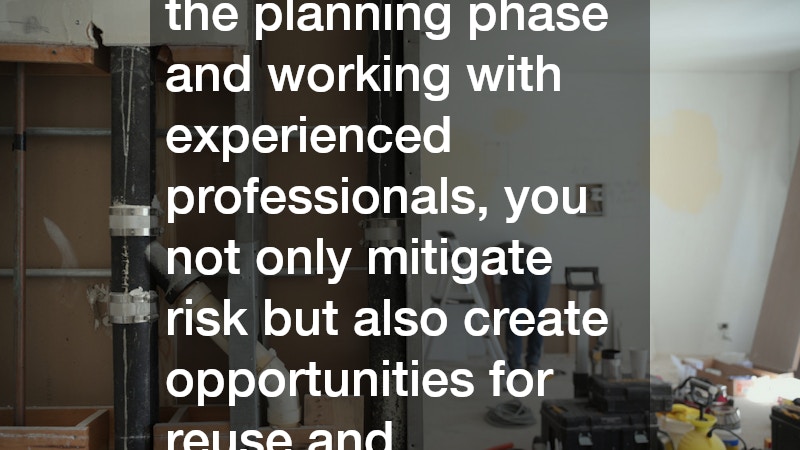Demolition is a critical phase in many construction and renovation projects. Whether it’s a small-scale residential teardown or a large-scale commercial dismantling, a well-executed demolition service ensures safety, efficiency and compliance with local regulations. However, demolition involves more than just knocking things down.
It requires thorough planning, expertise and an understanding of the complexities that come with different structures and materials. If you’re preparing for a project that involves any kind of structure removal, understanding the fundamentals can make a significant difference in achieving your goals with minimal disruption.
Understand the Scope of Your Project
Before engaging any contractor or proceeding with demolition work, it’s essential to have a clear understanding of the scope. This includes knowing exactly what parts of the structure need to be removed, what must be preserved and the intended outcome of the space once demolition is complete. Effective communication with architects, engineers and demolition professionals can help prevent costly misunderstandings and delays. Being precise about your project’s requirements also allows the demolition service to develop the best method for tackling the job, whether it involves mechanical demolition, deconstruction or a combination of both. Each method comes with its own set of challenges, timelines and cost implications, making this early stage crucial for overall project success.
Prioritise Safety at All Stages
Safety is paramount in any demolition operation. This applies not only to the workers on site but also to neighbouring properties, the environment and the general public. A professional demolition service will conduct a comprehensive risk assessment before beginning any work, identifying potential hazards such as asbestos, unstable structures and underground utilities. Appropriate safety measures, such as fencing, signage and the use of personal protective equipment, must be enforced throughout the duration of the project. Additionally, adhering to state and local regulations, including environmental protection and occupational health standards, is a non-negotiable requirement. Ignoring safety guidelines can result in severe legal and financial consequences, as well as irreversible damage to property and lives.
Choose the Right Demolition Method
Selecting the appropriate demolition method is key to completing a project on time and within budget. Manual demolition might be suitable for smaller projects or those requiring precise removal of materials, while mechanical demolition, involving heavy machinery like excavators and bulldozers, is often better for larger or more complex structures. There’s also controlled demolition, which uses explosives and is typically reserved for high-rise buildings and large industrial facilities. The right demolition service will assess your site and recommend the most efficient method based on the building’s materials, location, surrounding infrastructure and end goals. This tailored approach helps reduce waste, lower costs and ensure the project aligns with council requirements.
Plan for Waste Management & Recycling
One of the most overlooked aspects of a demolition project is the management of waste materials. A responsible demolition service will include a strategy for sorting, recycling and disposing of debris in an environmentally conscious manner. Many materials removed during demolition—such as concrete, steel, timber and bricks—can be repurposed or recycled, reducing landfill use and often lowering project costs. Moreover, having a well-structured waste management plan can streamline site clearance and improve workflow efficiency. With growing emphasis on sustainable practices in the construction industry, choosing a demolition provider that supports eco-friendly disposal methods adds value to your project and supports broader environmental goals.
Work with Licensed & Experienced Professionals
Engaging a reputable and fully licensed demolition service can make all the difference in the outcome of your project. Experienced providers bring a deep understanding of site-specific challenges and offer solutions that prevent problems before they arise. From securing permits and notifying relevant authorities to ensuring all activities are covered by the appropriate insurances, a qualified team will handle the administrative and technical requirements professionally. Additionally, seasoned professionals maintain a strong network of industry contacts, from engineers and safety inspectors to recycling facilities, which can expedite project timelines and reduce costs. Always verify a company’s credentials and seek client testimonials or reviews before signing any contracts.
Laying the Groundwork for a Safe & Successful Demolition
Demolition is more than just the destruction of a structure—it’s a strategic operation that requires planning, precision and expertise. When managed effectively, it sets a strong foundation for whatever comes next, whether that’s a new development, an extension or a fresh landscape design. Understanding the scope of your project, prioritising safety, selecting the right demolition method, planning for waste disposal and working with skilled professionals are all critical components of a successful demolition effort.
Choosing the right demolition service ensures your project is completed efficiently, legally and with minimal impact on the environment. By investing time in the planning phase and working with experienced professionals, you not only mitigate risk but also create opportunities for reuse and sustainability. Whether you’re clearing the way for a residential upgrade or undertaking a major commercial redevelopment, applying these essential tips will help you achieve your project goals with confidence and care.

